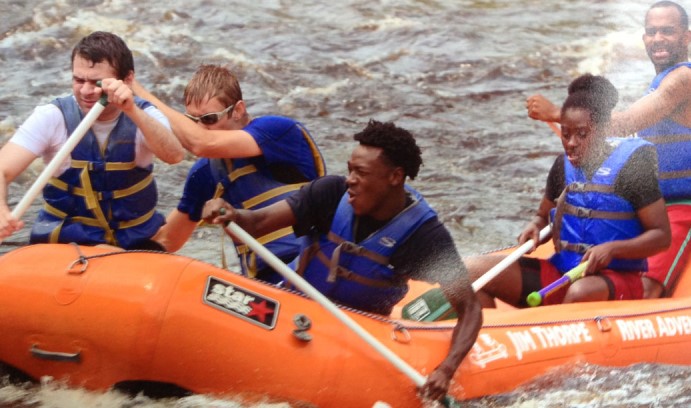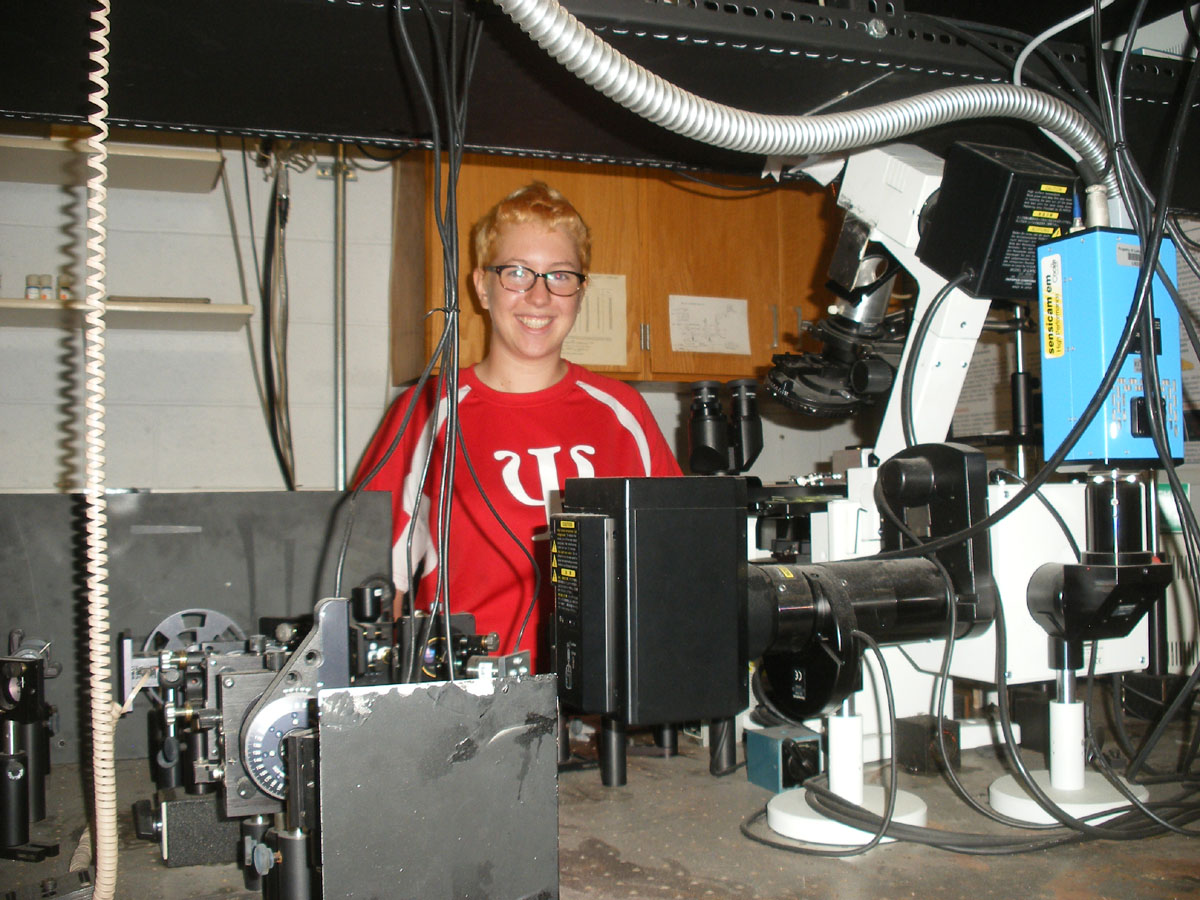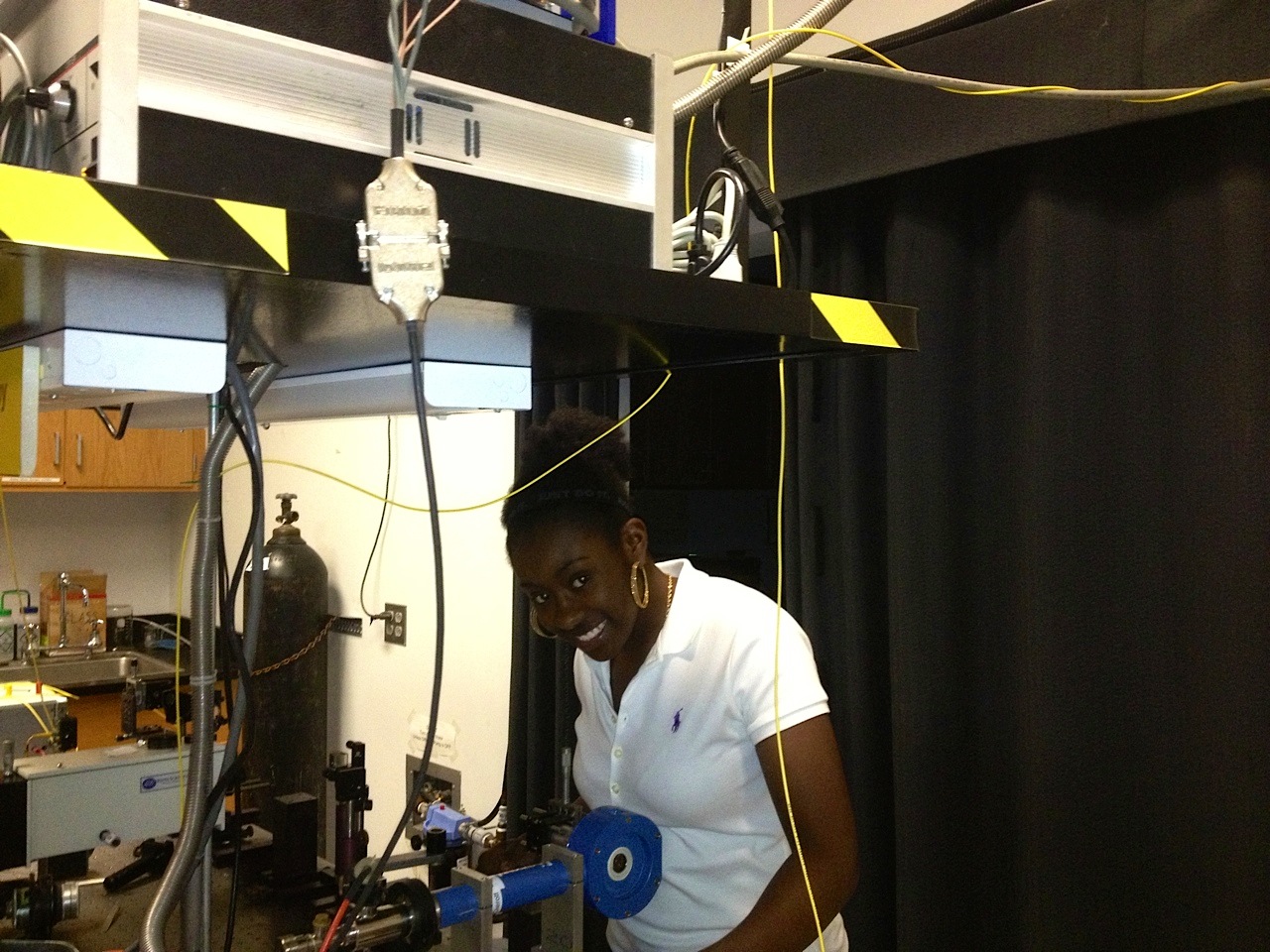Kudos for a groundbreaking summer program

Whitewater rafting trips, along with softball and seminars, help REU students bond outside their physics labs.
Two summers ago, Kathryn “KC” Reddy, an undergraduate physics student at Fordham University left New York City to spend 10 unforgettable weeks at Lehigh.
Working with Daniel Ou-Yang, professor of physics, Reddy studied and quantified how particles move within a liquid suspension. She used two advanced research techniques—electrophoresis, which applies an electric force field to move an electrically charged particle, and optical tweezers, which employ highly focused lasers to manipulate an individual particle.
Reddy would not have been able to delve into such a project in a typical undergraduate course. But the Research Experiences for Undergraduates (REU) program in Lehigh’s physics department gave her and two dozen other students from across the country the opportunity to choose an original research project and explore it under the guidance of professors, postdocs and graduate students.
The physics department’s summer REU program, one of the oldest of its kind in the nation, was founded in 1983 as the Lehigh Physics Summer Research Participation Program. In 1987, the National Science Foundation began funding its Research Experiences for Undergraduates program. The physics department has received funding from the NSF REU program for more than 25 years. The Lehigh program is also supported by the Jonathan Karas Educational Endowment Fund, which was established by the Karas Family Foundation.
The REU program was led until last year by John Huennekens, professor of physics, and is now directed by Volkmar Dierolf, professor and department chair, and Virginia McSwain, associate professor.
NSF recently announced that it will renew its REU grant to Lehigh for five years with an award of more than $700,000. A number of Sherman Fairchild Scholarships for research in solid state studies and electrical engineering also help fund the program, which is intended for rising juniors and seniors who plan to pursue graduate study in physics or related fields.
Competitive and inspiring
REU students receive a stipend and housing and pursue one of a variety of research areas, including astrophysics; atomic, molecular and plasma physics; biophysics, condensed matter physics, electrical engineering and nanoscience, materials science, photonics and nonlinear optics, and statistical physics. The program this year will begin in late May.
The physics department receives about 600 applications each year and accepts about 25 students.
“This program excites undergraduates to become researchers,” said Dierolf, “and it ends up helping physics and related fields as a whole.”
One of the best features of REU, said Dierolf, is that it provides research opportunities for groups that have historically been underrepresented in STEM (science, technology, engineering and mathematics) fields. Women made up half of last year’s students and racial minorities accounted for 16 percent, exceeding the national average for STEM participation for those groups, Dierolf said.
“We would like to see those figures go up even more, but we are delighted with the increasing diversity,” he said. “By increasing students’ awareness of careers in STEM fields, our program encourages students to consider STEM careers for their future.”
The STEM fields are suffering from what Dierolf and McSwain term a “leaky pipeline.” Along every step of their educational journey, from high school to undergraduate studies, and on to graduate school and academic careers, women and minorities drop out of these fields in large numbers. While the reasons may be complex, Lehigh faculty are glad for the ability to make positive changes through REU.
Students in the REU program compare notes on their work and learn from each other, as well as from their mentors, said McSwain, an astrophysicist who helps participants study stellar phenomena. Dierolf advises students who want to study condensed matter physics.
Every Friday, REU students attend a seminar series, in which faculty from Lehigh present their research. At the end of the summer, students present their own work to the group.
Outside the lab, students live together in a student residence hall on campus, sharing a kitchen, a common room and a social life. REU mentors organize events ranging from white water rafting and softball, to cooking lessons and visits to Dorney Park.
“The students have a real support network. They’re living here, so we want to make sure they have a great experience,” McSwain said.
Reddy’s experiences in Lehigh’s REU program cemented her plan to pursue physics research. She returned to Lehigh last summer to continue working with Ou-Yang. She also gave an oral presentation of her work in REU at an American Physical Society meeting in Baltimore and at research symposiums at Fordham and Syracuse University.
After returning last fall to Fordham, Reddy launched into another research project to understand the sedimentation equilibrium of particles in suspension. She was able to determine the thermodynamic equation of the state of electrically charged colloidal particles in water.
Reddy said the Lehigh REU program gave her the freedom in to solve problems while exploring her own ideas. Her advisers offered help when she needed it. “The postdocs and graduate students really care about you personally,” she said.
Dierolf and McSwain said that many REU students have gone on to research and academic careers.
The program also improves the students’ confidence.
“Unlike coursework, which makes students solve problems that they know already have a right and wrong answer, in this case, their professors don’t know the answer,” said Dierolf. “Nobody knows, so the students feel a freedom to try different ideas to find a solution to their questions.
“That’s original research.”
REU students are under no time pressure to find answers to their hypotheses, said Dierolf and McSwain, as are graduate students and postdocs. Their energy makes the campus a lively place.
“After so many years of developing the gold standard for REU programs, we feel this energy has become part of the genetic makeup of the physics department,” said Dierolf.
“We would feel a void if not for REU.”
Working with Daniel Ou-Yang, professor of physics, Reddy studied and quantified how particles move within a liquid suspension. She used two advanced research techniques—electrophoresis, which applies an electric force field to move an electrically charged particle, and optical tweezers, which employ highly focused lasers to manipulate an individual particle.
Reddy would not have been able to delve into such a project in a typical undergraduate course. But the Research Experiences for Undergraduates (REU) program in Lehigh’s physics department gave her and two dozen other students from across the country the opportunity to choose an original research project and explore it under the guidance of professors, postdocs and graduate students.
The physics department’s summer REU program, one of the oldest of its kind in the nation, was founded in 1983 as the Lehigh Physics Summer Research Participation Program. In 1987, the National Science Foundation began funding its Research Experiences for Undergraduates program. The physics department has received funding from the NSF REU program for more than 25 years. The Lehigh program is also supported by the Jonathan Karas Educational Endowment Fund, which was established by the Karas Family Foundation.
The REU program was led until last year by John Huennekens, professor of physics, and is now directed by Volkmar Dierolf, professor and department chair, and Virginia McSwain, associate professor.
NSF recently announced that it will renew its REU grant to Lehigh for five years with an award of more than $700,000. A number of Sherman Fairchild Scholarships for research in solid state studies and electrical engineering also help fund the program, which is intended for rising juniors and seniors who plan to pursue graduate study in physics or related fields.
Competitive and inspiring
REU students receive a stipend and housing and pursue one of a variety of research areas, including astrophysics; atomic, molecular and plasma physics; biophysics, condensed matter physics, electrical engineering and nanoscience, materials science, photonics and nonlinear optics, and statistical physics. The program this year will begin in late May.
The physics department receives about 600 applications each year and accepts about 25 students.
“This program excites undergraduates to become researchers,” said Dierolf, “and it ends up helping physics and related fields as a whole.”
One of the best features of REU, said Dierolf, is that it provides research opportunities for groups that have historically been underrepresented in STEM (science, technology, engineering and mathematics) fields. Women made up half of last year’s students and racial minorities accounted for 16 percent, exceeding the national average for STEM participation for those groups, Dierolf said.
“We would like to see those figures go up even more, but we are delighted with the increasing diversity,” he said. “By increasing students’ awareness of careers in STEM fields, our program encourages students to consider STEM careers for their future.”
The STEM fields are suffering from what Dierolf and McSwain term a “leaky pipeline.” Along every step of their educational journey, from high school to undergraduate studies, and on to graduate school and academic careers, women and minorities drop out of these fields in large numbers. While the reasons may be complex, Lehigh faculty are glad for the ability to make positive changes through REU.
Students in the REU program compare notes on their work and learn from each other, as well as from their mentors, said McSwain, an astrophysicist who helps participants study stellar phenomena. Dierolf advises students who want to study condensed matter physics.
Every Friday, REU students attend a seminar series, in which faculty from Lehigh present their research. At the end of the summer, students present their own work to the group.
Outside the lab, students live together in a student residence hall on campus, sharing a kitchen, a common room and a social life. REU mentors organize events ranging from white water rafting and softball, to cooking lessons and visits to Dorney Park.
“The students have a real support network. They’re living here, so we want to make sure they have a great experience,” McSwain said.
Reddy’s experiences in Lehigh’s REU program cemented her plan to pursue physics research. She returned to Lehigh last summer to continue working with Ou-Yang. She also gave an oral presentation of her work in REU at an American Physical Society meeting in Baltimore and at research symposiums at Fordham and Syracuse University.
After returning last fall to Fordham, Reddy launched into another research project to understand the sedimentation equilibrium of particles in suspension. She was able to determine the thermodynamic equation of the state of electrically charged colloidal particles in water.
Reddy said the Lehigh REU program gave her the freedom in to solve problems while exploring her own ideas. Her advisers offered help when she needed it. “The postdocs and graduate students really care about you personally,” she said.
Dierolf and McSwain said that many REU students have gone on to research and academic careers.
The program also improves the students’ confidence.
“Unlike coursework, which makes students solve problems that they know already have a right and wrong answer, in this case, their professors don’t know the answer,” said Dierolf. “Nobody knows, so the students feel a freedom to try different ideas to find a solution to their questions.
“That’s original research.”
REU students are under no time pressure to find answers to their hypotheses, said Dierolf and McSwain, as are graduate students and postdocs. Their energy makes the campus a lively place.
“After so many years of developing the gold standard for REU programs, we feel this energy has become part of the genetic makeup of the physics department,” said Dierolf.
“We would feel a void if not for REU.”
Posted on:
Friday, March 21, 2014



